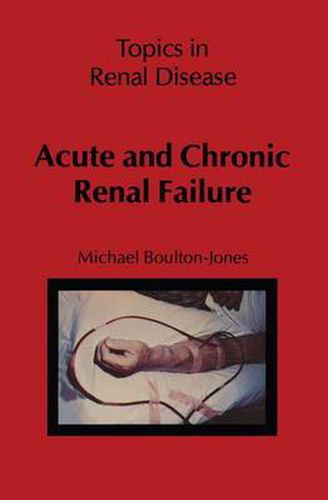Readings Newsletter
Become a Readings Member to make your shopping experience even easier.
Sign in or sign up for free!
You’re not far away from qualifying for FREE standard shipping within Australia
You’ve qualified for FREE standard shipping within Australia
The cart is loading…






This title is printed to order. This book may have been self-published. If so, we cannot guarantee the quality of the content. In the main most books will have gone through the editing process however some may not. We therefore suggest that you be aware of this before ordering this book. If in doubt check either the author or publisher’s details as we are unable to accept any returns unless they are faulty. Please contact us if you have any questions.
Renal function fails abruptly in a bewildering variety of clinical situations which lack any common clinical patterno This makes it impossible to define acute renal failure in the same way as heart failure or liver failureo Even oliguria, the commonest sign, is not invariably present. As a result, the detection of acute renal failure Table 1. Causes of acute renal failureo Acute tubular necrosis Ischaemic type Nephrotoxic type Cortical necrosi . * Hepatorenal syndrome Occlusion of main renal arteries Occlusion of arterioles Malignant hypertension Haemolytic uraemic syndrome Thrombotic thrombocytopenic purpura Postpartum nephrosclerosis Acute glomerulonephritis Post-streptococcal ‘Crescentic’ nephritis } do thO th t dO Necrotizing glomerulitis I IOpa IC WI sys emlc Iseases Renal vein thrombosis Obstruction U ric acid crystals Stones Tumours-benign and malignant Fibrosis Strictures 2 Acute and Chronic Renal Failure (ARF) depends on biochemical tests, which are fortunately simple to perform and are commonly available. However, the clinician has to think of the possibility in order to test the diagnosis. Frequently, patients are admitted to a renal unit from medical, surgical or gynaecological wards where the development of ARF has gone unrecognized, either because the relevant investigation has not been performed or because the result has been overlooked. This happens because ARF occurs in patients with complex problems which themselves demand con- siderable attention, and it is easy to overlook a comparatively rare, if important, complication.
$9.00 standard shipping within Australia
FREE standard shipping within Australia for orders over $100.00
Express & International shipping calculated at checkout
This title is printed to order. This book may have been self-published. If so, we cannot guarantee the quality of the content. In the main most books will have gone through the editing process however some may not. We therefore suggest that you be aware of this before ordering this book. If in doubt check either the author or publisher’s details as we are unable to accept any returns unless they are faulty. Please contact us if you have any questions.
Renal function fails abruptly in a bewildering variety of clinical situations which lack any common clinical patterno This makes it impossible to define acute renal failure in the same way as heart failure or liver failureo Even oliguria, the commonest sign, is not invariably present. As a result, the detection of acute renal failure Table 1. Causes of acute renal failureo Acute tubular necrosis Ischaemic type Nephrotoxic type Cortical necrosi . * Hepatorenal syndrome Occlusion of main renal arteries Occlusion of arterioles Malignant hypertension Haemolytic uraemic syndrome Thrombotic thrombocytopenic purpura Postpartum nephrosclerosis Acute glomerulonephritis Post-streptococcal ‘Crescentic’ nephritis } do thO th t dO Necrotizing glomerulitis I IOpa IC WI sys emlc Iseases Renal vein thrombosis Obstruction U ric acid crystals Stones Tumours-benign and malignant Fibrosis Strictures 2 Acute and Chronic Renal Failure (ARF) depends on biochemical tests, which are fortunately simple to perform and are commonly available. However, the clinician has to think of the possibility in order to test the diagnosis. Frequently, patients are admitted to a renal unit from medical, surgical or gynaecological wards where the development of ARF has gone unrecognized, either because the relevant investigation has not been performed or because the result has been overlooked. This happens because ARF occurs in patients with complex problems which themselves demand con- siderable attention, and it is easy to overlook a comparatively rare, if important, complication.